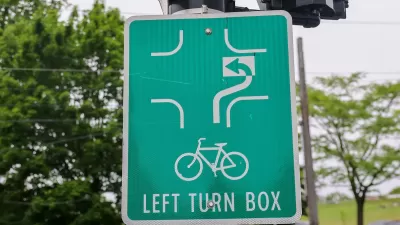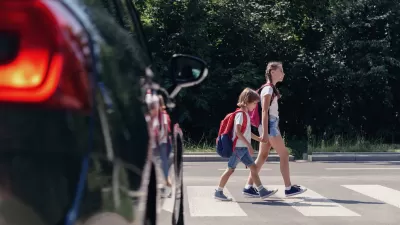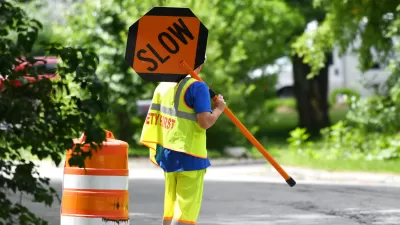The association's proposed changes to the manual include a focus on eliminating road deaths, improving pedestrian safety, and creating a more inclusive public process.

The National Association of City Transportation Officials (NACTO) has published a set of recommendations for updating the Manual on Uniform Traffic Control Devices (MUTCD) "into a proactive, multimodal safety regulation" as the Federal Highway Administration (FHWA) moves to update the document.
According to NACTO, "a reframed MUTCD is instrumental in pushing for safer, more sustainable, and equitable streets." Their recommended changes, based on "a full review of the MUTCD’s draft 11th edition with engineers, planners, and other practitioners across [NACTO's] member network," include:
- "Elevate the goal of eliminating serious injuries and deaths"
- "Modernize speed limits"
- "Make it safer to cross the street"
- "Promote people over robots on our streets"
- "Legalize commonsense treatments for people walking, biking, and taking transit"
- "Uplift best practices for bikeways, rather than prohibiting them"
- "Listen to more voices"
NACTO argues that "[i]ncorporating these comments would form the basis of a reframed, rewritten, and renewed MUTCD that prioritizes safety and the needs of more people on our streets." They also encourage the FHWA to prioritize a "more inclusive process for updating the MUTCD" that strives to understand the needs of communities that may not be able to take part in the current public comment process. "NACTO staff, and staff in our 89 member cities, were in the position to contribute hundreds of hours of time and expertise to inform the comments we’re submitting. But, many other key stakeholders affected by the MUTCD, including advocates for youth, elderly, and/or disabled, and climate, equity, and public health experts (overstretched at this time of many overlapping crises), do not have this time. The MUTCD will be a weaker document without their valuable input."
FULL STORY: A Blueprint to Update America’s Street Manual

Alabama: Trump Terminates Settlements for Black Communities Harmed By Raw Sewage
Trump deemed the landmark civil rights agreement “illegal DEI and environmental justice policy.”

Planetizen Federal Action Tracker
A weekly monitor of how Trump’s orders and actions are impacting planners and planning in America.

The 120 Year Old Tiny Home Villages That Sheltered San Francisco’s Earthquake Refugees
More than a century ago, San Francisco mobilized to house thousands of residents displaced by the 1906 earthquake. Could their strategy offer a model for the present?

LA’s Tree Emergency Goes Beyond Vandalism
After a vandal destroyed dozens of downtown LA trees, Mayor Karen Bass vowed to replace them. Days later, she slashed the city’s tree budget.

Sacramento Leads Nation With Bus-Mounted Bike Lane Enforcement Cameras
The city is the first to use its bus-mounted traffic enforcement system to cite drivers who park or drive in bike lanes.

Seattle Voters Approve Social Housing Referendum
Voters approved a corporate tax to fund the city’s housing authority despite an opposition campaign funded by Amazon and Microsoft.
Urban Design for Planners 1: Software Tools
This six-course series explores essential urban design concepts using open source software and equips planners with the tools they need to participate fully in the urban design process.
Planning for Universal Design
Learn the tools for implementing Universal Design in planning regulations.
Ada County Highway District
Clanton & Associates, Inc.
Jessamine County Fiscal Court
Institute for Housing and Urban Development Studies (IHS)
City of Grandview
Harvard GSD Executive Education
Toledo-Lucas County Plan Commissions
Salt Lake City
NYU Wagner Graduate School of Public Service





























